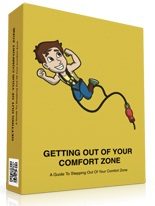
 License Type: Personal Use
License Type: Personal Use  File Type: ZIP
File Type: ZIP
 SKU: 62324
SKU: 62324  Shipping: Online Download
Shipping: Online Download
Sample Content Preview
Introduction
A ‘Comfort Zone’ is defined as a state which is familiar, and a person feels at ease and in control. When you’re in your comfort zone, your blood pressure is lower, your heart beats slower, you feel like you have enough to eat and drink, and probably have affection in your life. We’re hard-wired to accept these conditions as ideal. Who wouldn’t want to be in a place where they’re protected, adored, and in control? The problem is, comfort is only comfortable when there is nothing to disrupt it. Nothing changes. Neale Donald Walsch, author, and motivational speaker put it this way: “Life begins at the end of your comfort zone.”
The very definition of a “comfort zone” precludes any change. There can be no growth, no creativity, no advancement, no change, or it wouldn’t be a comfort zone.
But true growth, excellence, and achievement cannot come from stagnation. Your dreams, your goals cannot be achieved unless you are first willing to leave your comfort zone and spread out, take chances and occasionally fail.
Think of the muscles in your body. If you never stand or walk or run, your leg muscles will eventually give out and atrophy. To have strong muscles, you need to press them, challenge them, and make them sore. Yet even knowing this, it’s easier to sit with your feet up and watch TV, even if that won’t help your leg strength.
As scary as it can be, as painful as it can be, breaking out of the comfort zone is not only important, its mandatory to reach your goals. Remaining where nothing changes means stagnation and death if only the death of a dream or the future.
It’s no myth that horses will run into a burning barn. The stall they’ve lived in for so long has become a comfort zone. There they are fed and groomed and kept from harm, so they return to what’s safe.
Animals who spend too much time in a small cage will often limit their activities to an area that fits that pen, even when given a larger expanse, or even freedom. That which exists outside of the comfort zone is frightening and unpredictable. It’s also where life happens. And as frightening as it may be, leaving the comfort zone is a vital step in growth.
Here’s the catch: Once you have moved out of your comfort zone, you’ll create a new one. Motivational speaker, Robin Sharma said: “As you move outside of the comfort zone, what was once the unknown and frightening becomes your new normal.”
In the analogy of the caged animal, they may have been free to roam in the wilds once, fighting incarceration, but the cage they feared now becomes the very cage they fear to leave.
Comfort zones are good places to rest, to gather strength, to analyze and even examine your life, but you can’t stay in one forever. In order to grow, you need to consistently push yourself harder and harder.
Let’s take a look at comfort zones. Why are they so hard to leave? Why are they necessary? And how can we break free from them and finally grow?
Benefits of Getting Out of the Zone
At the turn of the 20th century, two psychologists determined that “a state of relative comfort created a steady level of performance.” In other words, once we reach a comfort zone, we expend as much energy as we need to remain static in that zone.
When change is forced upon us by events out of our control, then we change our efforts to fit the new “normal.” If the comfort zone is threatened or altered, we may have to worker harder to maintain it through rising costs and then adjust to the new reality. If things become easier, then the temptation is to lessen our efforts as it’s easier to maintain the status quo.
That’s why it’s a “comfort zone” – it requires no extra effort to maintain. Notice, however, that the new normal becomes the new comfort zone. Growth and progress come just outside of the comfort zone, in a state referred to as “optimal anxiety.”
Optimal anxiety isn’t a new idea. If you’ve accomplished something great, or been able to reach a goal, you’ve been there already. It’s found where you’ve pushed yourself to meet that goal.
Bear in mind that pushing too hard or being pushed too hard will create a pushback response, and performance takes a dramatic downturn. In this case, it can also reinforce the idea that challenging yourself is a bad idea. You can even convince yourself that you’re unable to succeed. We naturally want to return to our comfort zone.
This means that leaving the comfort zone isn’t easy. However, with practice and continued success, challenging ourselves can become addictive in the way athletes become “addicted” to working out and pushing themselves physically.
Even though pushing out of your comfort zone is uncomfortable and challenging, there are many benefits to sticking to it. Here's a list of benefits you can look forward to once you are committed to moving towards your fullest potential.
Your self-awareness will increase
“Every entrepreneur knows how agonizingly difficult it is to make the decision to give it your all, knowing that failure is inevitable; the successful ones know that the only way to get back up is through learning from that failure.” Fabrizio Moreira, Ecuadorian political dissident, and businessman.
The difference between “failing” and “learning” is whether you get up and try again or not.
You won’t recognize yourself
Seriously. If you set out to prove you can write a novel and you do, you will forever see yourself as someone who has written a book. If you set your goal to make Vice President of the company, and you do, you will see yourself as a “go-getter” who can and has climbed the corporate ladder.
Getting out of your comfort zone means you have to reassess who you are and how you see yourself. It creates confidence and self-assurance. You might even be surprised how much you like the new you.
Others will see you differently too
You’re going to be the go-getter at the office everyone talks about and envies. You’re going to be the example to others who don’t leave their comfort zones. 7 Have you ever wondered how someone got to where they are in life or in work? That’s going to be you, and that new perspective will change the way others see you, probably forever.
You’ll learn new skillsets
When you take a step out of your comfort zone, you’ll get the opportunity to develop new skills and abilities. This is one of the things that makes life exciting instead of boring.
Your productivity will increase
Comfort is the best, fastest and most sure way to kill productivity. How many times have you described your current job as a “rut”? If you’re only making the barest minimum effort to maintain, you’re not producing near what you could be doing.
Leaving the comfort zone hones your focus and concentration. Taking a risk can be scary, but it’s also exciting. Once you take that first step, you’ll notice you look forward to learning new skills and attacking different tasks. Life is no longer ordinary. Learning new things will improve your focus and concentration so that you are more productive and on-task.
You’ll get further than you ever believed possible
Once you step outside of the comfort zone, you’ll push yourself harder, focus better and achieve more than you ever thought possible. Remember that failing is okay, it’s part of learning. You might find that each trial, each learning experience is a milestone getting you closer and closer to your goal. You might even discover that you can go past your goal and achieve even more than you ever dreamed of.
Change will come easier
Getting out of your comfort zone means that you’ll be better equipped for change. You’ll become more resilient. So, when unexpected changes come, or your plans don’t go exactly as you’d hoped, it will be easier to bounce back.
You’ll be more creative
There’s really no reason to be creative when you’re resting in the comfort zone. But branching out will help you to see things from new perspectives. Those new perspectives along with the new challenges you’ll take on will inspire you to get more creative in your problemsolving. It will help you think outside of the box.
Don’t misunderstand, a comfort zone is not a “bad” thing, nor is it intrinsically good. It simply is. It’s a natural state toward which we all gravitate, becoming enamored with the concept of comfort and security. Comfort zones are for resting, for taking stock, for assessing all we have accomplished and created and have done. They are necessary. They are also addictive, and occasionally hard to break out of.
When the comfort zone is a place we refuse to leave altogether, that’s when it becomes problematic. Going to bed is a necessary thing for rest but staying in bed all day leads to depression and irritability. Let the comfort zone give you rest and peace, but when it’s time to move on, move on. The benefits will be worth the challenges.







